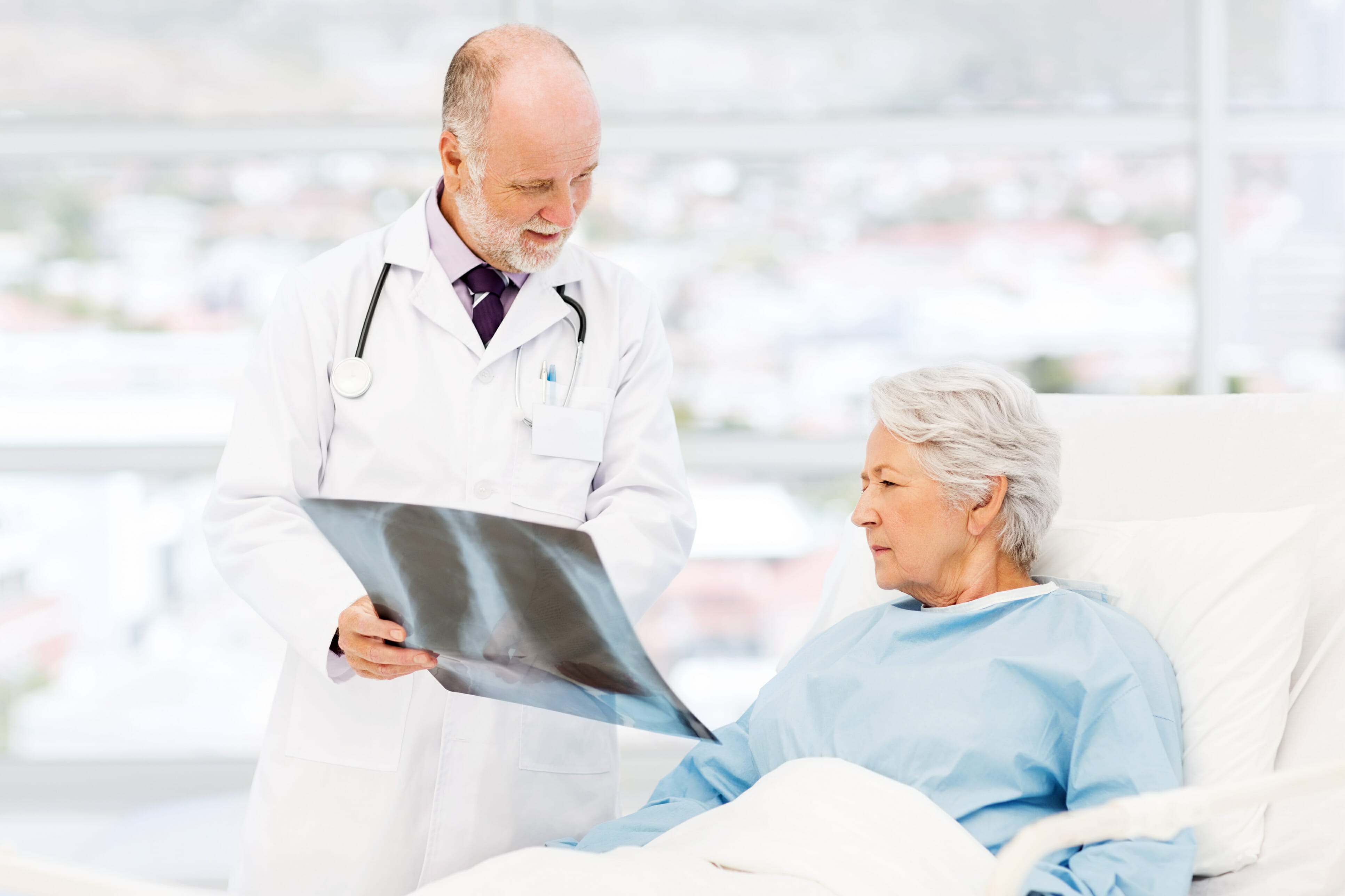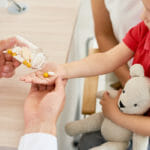Pneumonia affects 450 million people every year, which is about 7% of the global population, with a majority of those affected being seniors and young children.
It is typically caused by bacteria or viruses, although autoimmune diseases and other conditions can have the same effect. It occurs when the alveoli, or the microscopic air sacs of the lungs, become inflamed or swollen, and it can occur in one or both lungs.
Let’s learn a little bit more about pneumonia.
Key Takeaways
It is important for loved ones, friends, and medical staff to be aware of the symptoms of pneumonia because it can be potentially life-threatening.
Common symptoms include fever, chest pain, mucus production, difficulty breathing, cough, shaking and/or chills. In some cases, especially among seniors, symptoms such as confusion and dizziness may occur.
In addition to medical treatment after visiting an intensive care unit or at their long-term care facilities, elderly individuals can help their body overcome pneumonia by resting and avoiding physical exertion, drinking plenty of fluids, avoiding smoking, and eating a healthy diet.
What is Pneumonia?
IN THIS ARTICLE
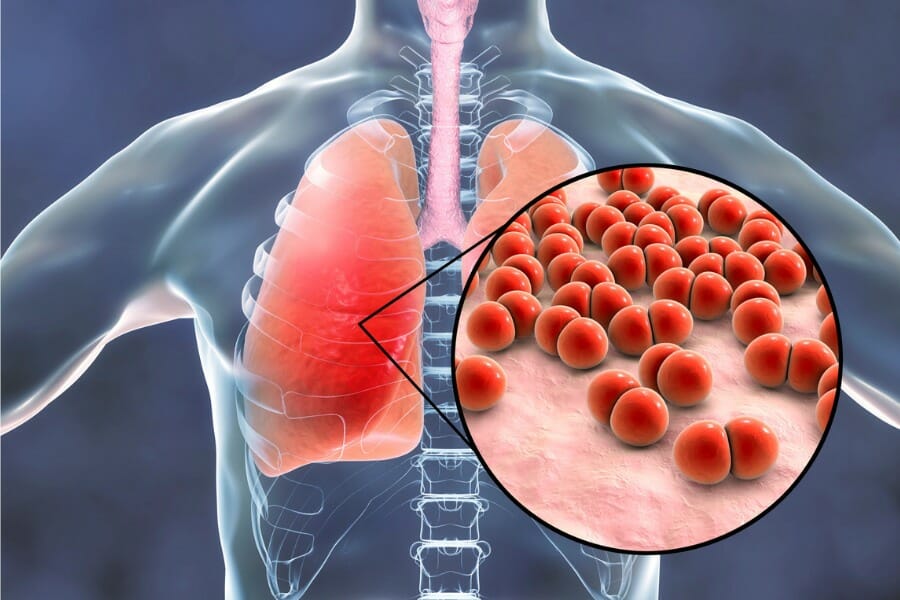
Pneumonia is a respiratory infection that causes inflammation in the air sacs (alveoli) in the lungs. The inflammation can be caused by a variety of germs, including bacteria, viruses, and fungi. Infection can lead to fluid buildup in the lungs, which can make it difficult to breathe.
Pneumonia can range in severity from mild to life-threatening. It is especially dangerous for the elderly, infants, and people with weakened immune systems. Pneumonia can be a serious condition for seniors and leads to an estimated 1 million hospitalizations among the age group each year.
The symptoms of pneumonia can vary depending on the cause and severity of the infection. Common symptoms include cough, fever, shortness of breath, chest pain, and fatigue. In severe cases, pneumonia can lead to complications such as sepsis, respiratory failure, and even death.
There are several ways to avoid pneumonia and reduce the risk of infection, including vaccines, handwashing, and avoiding exposure to tobacco smoke and other pollutants. Early diagnosis and treatment are crucial for a full recovery from pneumonia. Treatment may include antibiotics, antiviral medications, oxygen therapy, and rest.
In summary, pneumonia is a respiratory infection that can be caused by a variety of germs and can range in severity from mild to life-threatening. It is especially dangerous for the elderly, infants, and people with weakened immune systems. Symptoms include cough, fever, shortness of breath, chest pain, and fatigue. Avoidance of risk factors and early diagnosis and treatment are crucial for a full recovery.
Types of Pneumonia in the Elderly
Pneumonia is an infection of the lungs that can be caused by a variety of pathogens, including bacteria, viruses, and fungi.
The type of pneumonia a person has can impact their symptoms, treatment options, and recovery time. In the elderly, several types of pneumonia are particularly common, including community-acquired pneumonia, aspiration pneumonia, bacterial pneumonia, and viral pneumonia.
Community-acquired pneumonia (CAP) is a type of pneumonia that occurs outside of the hospital or healthcare setting.
CAP is one of the most common types of pneumonia in the elderly and can be caused by a variety of pathogens, including bacteria, viruses, and fungi. Symptoms of CAP in the elderly can include cough, fever, shortness of breath, and confusion. Treatment for CAP typically involves antibiotics and supportive care.
Aspiration pneumonia occurs when a person inhales food, liquid, or other foreign material into their lungs. This type of pneumonia is more common in the elderly because they are more likely to have difficulty swallowing or to have medical conditions that increase their risk of aspiration.
Bacterial pneumonia is a type of pneumonia caused by bacteria. In the elderly, bacterial pneumonia is often caused by Streptococcus pneumoniae or Haemophilus influenzae. Symptoms of bacterial pneumonia can include cough, fever, shortness of breath, and chest pain. Treatment for bacterial pneumonia typically involves antibiotics and supportive care.
Viral pneumonia is a type of pneumonia caused by a virus. In the elderly, viral pneumonia is often caused by influenza viruses or respiratory syncytial virus (RSV). Symptoms of viral pneumonia can include cough, fever, and shortness of breath. Treatment for viral pneumonia may involve antiviral medications and supportive care.
Overall, the type of pneumonia a person has can impact their symptoms, treatment options, and recovery time. In the elderly, several types of pneumonia are particularly common, including community-acquired pneumonia, aspiration pneumonia, bacterial pneumonia, and viral pneumonia. It is important for healthcare providers to consider the type of pneumonia a patient has when developing a treatment plan.
What are the causes of Pneumonia in Elderly Individuals?
Pneumonia is a common respiratory infection that affects people of all ages, but elderly individuals are at a higher risk of developing it. There are several causes of pneumonia in elderly individuals, including:
- Age: As people age, their immune system weakens, making them more susceptible to infections like pneumonia.
- Smoking: Smoking weakens the lungs and damages the airways, making it easier for bacteria and viruses to cause infections like pneumonia.
- Alcohol: Excessive alcohol consumption can also weaken the immune system, making it harder for the body to fight off infections like pneumonia.
- Overall health: Elderly individuals with underlying health conditions such as heart disease, chronic obstructive pulmonary disease (COPD), or diabetes are at a higher risk of developing pneumonia.
- Influenza: Influenza, also known as the flu, can weaken the immune system and make people more susceptible to developing pneumonia.
- COVID-19: COVID-19 is a respiratory illness caused by the SARS-CoV-2 virus that can lead to pneumonia in severe cases, especially in elderly individuals.
It is important for elderly individuals to take precautions to prevent pneumonia, such as getting vaccinated against the flu and COVID-19, practicing good hygiene, and avoiding smoking and excessive alcohol consumption.
Symptoms of Pneumonia in Seniors
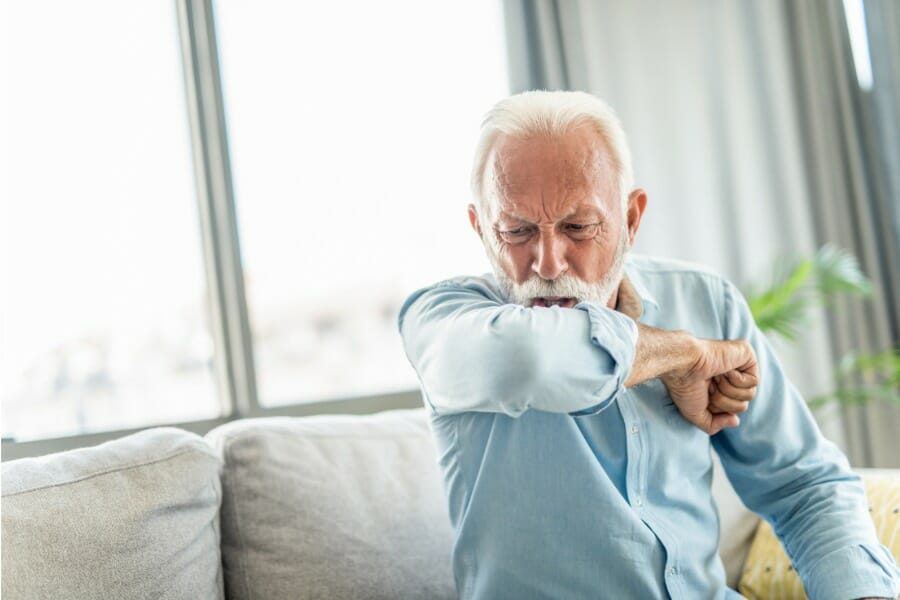
Pneumonia can be a serious respiratory infection, especially for older adults. It is important to be aware of the symptoms of pneumonia in seniors to seek medical attention promptly.
Common symptoms of pneumonia in seniors may include:
- Cough: A persistent cough is a common symptom of pneumonia. The cough may produce phlegm or mucus, which may be green, yellow, or bloody.
- Fever: Seniors with pneumonia may have a fever, although not always. A temperature of 100.4°F (38°C) or higher is considered a fever.
- Shortness of breath: Difficulty breathing or shortness of breath is a common symptom of pneumonia, especially during physical activity or exertion.
- Chest pain: Seniors with pneumonia may experience chest pain, which may worsen with deep breathing or coughing.
- Confusion: In some cases, pneumonia can cause confusion, especially in older adults. Confusion may be accompanied by other symptoms, such as disorientation or memory loss.
- Fatigue: Seniors with pneumonia may feel more tired than usual and have less energy to perform day-to-day activities.
- Chills and sweating: Pneumonia may cause chills and sweating, especially during fever episodes.
- Nausea and vomiting: Some seniors with pneumonia may experience nausea and vomiting, although this is more common in children.
- Difficulty breathing or trouble breathing: Seniors with pneumonia may feel like they are having difficulty breathing or have trouble catching their breath.
- Urinary incontinence: In some cases, pneumonia may cause urinary incontinence, especially in older adults.
It is important to note that not all seniors with pneumonia will experience all of these symptoms. Some may only have a few symptoms, while others may have more severe symptoms. If you or a loved one experiences any of these symptoms, especially if they persist for several days, it is important to seek medical attention promptly.
What are the Dangers of Pneumonia?
Pneumonia is a serious respiratory infection that can affect people of all ages. However, it is particularly dangerous for older adults, who are more likely to develop complications that can be life-threatening. Here are some of the dangers of pneumonia in the elderly:
Hospitalization
According to Verywell Health, more than 1 million adults in the United States are hospitalized for pneumonia each year, and 50,000 people die from it. Older adults are more likely to require hospitalization for pneumonia than younger people, and they may need to stay in the hospital for longer periods of time.
Weakened Immune System
As people age, their immune system becomes weaker, making it more difficult for them to fight off infections like pneumonia. This can make it more difficult for older adults to recover from pneumonia and increase their risk of developing complications.
Increased Risk of Death
Older adults with pneumonia are at an increased risk of death compared to younger people. According to Healthline, the mortality rate for pneumonia in people over the age of 65 is around 10%, compared to less than 1% in people under 65.
Complications
Pneumonia can lead to a range of complications in older adults, including respiratory failure, sepsis, and lung abscesses. These complications can be life-threatening and may require intensive medical treatment.
Other Health Conditions
Older adults with underlying health conditions, such as heart disease, diabetes, or lung disease, are at an increased risk of developing complications from pneumonia. They may also have a more difficult time recovering from the infection.
In summary, pneumonia is a serious respiratory infection that can be particularly dangerous for older adults. It can lead to hospitalization, weakened immune system, increased risk of death, complications, and worsen other health conditions. It is important for older adults to take steps to prevent pneumonia and seek medical treatment if they develop symptoms.
Diagnosis of Pneumonia
Diagnosing pneumonia in the elderly can be challenging as the symptoms can be similar to those of other respiratory illnesses. The doctor will typically begin by taking a medical history and performing a physical examination. They will ask the patient about their symptoms, including cough, fever, shortness of breath, and chest pain.
The doctor may also order a chest X-ray to confirm the diagnosis. The X-ray will show new shadowing in the lungs that is not due to any other cause, such as pulmonary edema or infarction. Pulse oximetry may also be used to measure the oxygen level in the blood. Pneumonia can prevent the lungs from moving enough oxygen into the bloodstream.
In addition to these tests, the doctor may order blood tests to check for signs of infection. These tests can include a complete blood count (CBC) and a blood culture. The CBC measures the number of white blood cells in the blood, which can indicate an infection. A blood culture can identify the specific bacteria causing the infection, which can help guide treatment.
If the patient is coughing up sputum, the doctor may order a sputum culture. This test can identify the specific bacteria causing the infection and can help guide treatment. The doctor may also perform a bronchoscopy, which involves inserting a thin, flexible tube into the lungs to collect a sample of lung tissue or fluid for testing.
Overall, diagnosing pneumonia in the elderly requires a careful evaluation of the patient’s symptoms and a combination of tests to confirm the diagnosis and identify the specific cause of the infection.
Treatment and Management
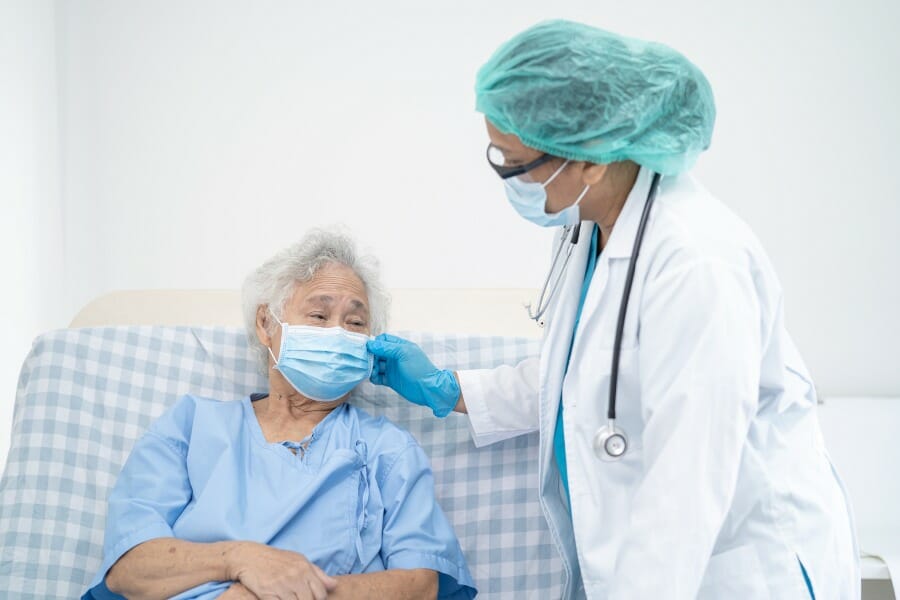
Treatment for pneumonia in the elderly depends on the severity of the illness, the underlying cause, and the patient’s overall health.
This is very different than other care and treatment plans for seniors, such as wound care or assistance with daily activities of living.
Antibiotic treatment is commonly prescribed to treat bacterial pneumonia. The choice of antibiotic will depend on the type of bacteria causing the infection and the patient’s medical history. It is important to complete the full course of antibiotics prescribed by the doctor, even if the patient starts to feel better.
Hospitalization may be necessary for elderly patients with severe pneumonia or those with underlying health conditions that increase the risk of complications. In the hospital, patients may receive oxygen therapy to help with breathing and medications to reduce fever and relieve pain.
In some cases, surgery may be necessary to remove infected lung tissue or to drain fluid from the lungs. This is more common in patients with complicated pneumonia or those who have not responded to other treatments.
In addition to medical treatment, there are steps that can be taken to manage pneumonia in the elderly. These include:
- Resting and avoiding physical exertion
- Drinking plenty of fluids to prevent dehydration
- Eating a healthy diet to support the immune system
- Avoiding smoking and secondhand smoke
- Practicing good hand hygiene to prevent the spread of infection
It is important to follow the doctor’s instructions for treatment and to attend all follow-up appointments. With prompt and appropriate treatment, most elderly patients with pneumonia can recover fully.
Complications and Severity
Pneumonia in elderly patients can be severe and lead to complications. The severity of pneumonia in the elderly is often related to the underlying health of the patient. Elderly patients with chronic underlying lung diseases like COPD are more susceptible to severe pneumonia.
One of the complications of pneumonia in the elderly is lung abscess. A lung abscess is a collection of pus in the lung tissue. This can occur when pneumonia is not treated promptly or when the immune system is weak. Elderly patients with lung abscesses may experience symptoms such as coughing up blood, chest pain, and shortness of breath.
Respiratory failure is another complication of pneumonia in the elderly. This occurs when the lungs are unable to provide enough oxygen to the body. Elderly patients with respiratory failure may require mechanical ventilation to help them breathe.
Therefore, doctors are quick to check a patient’s respiratory rate if pneumonia is a concern.
Acute respiratory distress syndrome (ARDS) is a severe complication of pneumonia in the elderly. ARDS occurs when the lungs become severely inflamed and fill with fluid. This can lead to respiratory failure and even death. Elderly patients with ARDS may require intensive care and mechanical ventilation.
Sepsis is a potentially life-threatening complication of pneumonia in the elderly. Sepsis occurs when the body’s immune system responds to an infection by releasing chemicals into the bloodstream. This can lead to organ failure and even death.
Elderly patients with sepsis may require hospitalization and aggressive treatment to improve their respiratory rate.
Prevention Strategies
Preventing pneumonia is crucial, especially in the elderly population where it can lead to severe complications. Here are some strategies that can help prevent pneumonia in the elderly:
Vaccines
Vaccines are one of the most effective ways to prevent pneumonia. The pneumococcal vaccine is recommended for all adults over the age of 65, as well as those with certain medical conditions. This vaccine protects against the most common types of bacteria that cause pneumonia.
In addition to the pneumococcal vaccine, getting an annual flu shot is also important. The flu can lead to pneumonia, and the elderly population is at a higher risk of complications from the flu.
Hygiene
Good hygiene practices can also help prevent the spread of pneumonia. Washing hands regularly with soap and water, avoiding close contact with sick people, and covering the mouth and nose when coughing or sneezing can all help reduce the risk of infection.
Exercise and Balanced Diet
Maintaining a healthy lifestyle is also important in preventing pneumonia. Regular exercise can help improve overall health and strengthen the immune system. A balanced diet with plenty of fruits, vegetables, and whole grains can also help support a healthy immune system.
Prevention
Prevention is key in avoiding pneumonia. If you smoke, quitting can help reduce the risk of respiratory infections. Avoiding exposure to pollutants and irritants, such as secondhand smoke, can also help protect the lungs.
In addition, it’s important to stay up to date with recommended health screenings and check-ups. Early detection and treatment of underlying medical conditions can help prevent complications from pneumonia.
Overall, a combination of vaccines, good hygiene practices, healthy lifestyle habits, and prevention strategies can help reduce the risk of pneumonia in the elderly population.
Recovery and Prognosis
Recovery from pneumonia in the elderly can vary depending on the individual’s overall health and the severity of the infection. For those in good health, the recovery time can be around three weeks. During this period, shortness of breath, weakness, and fatigue are common symptoms that can persist for some time. However, it is important to note that if the person has existing health conditions, especially those that involve the respiratory system, such as COPD, the recovery period can take as long as 60 or more days and be far more challenging.
With proper treatment, the majority of elderly individuals with pneumonia will recover fully. However, some may experience a slower recovery or be at risk of developing complications, such as sepsis or respiratory failure. It is essential to closely monitor the individual’s symptoms and progress during recovery to ensure that they are improving and not worsening.
Rest is a crucial component of the recovery process for pneumonia in the elderly. It is recommended that individuals get plenty of rest and avoid physical exertion until they have fully recuperated. Adequate hydration is also important to help the body fight off the infection and aid in recovery.
It is common for elderly individuals to experience a decline in physical function after a bout of pneumonia. This decline can be due to muscle weakness, fatigue, and other factors. It is essential to work with healthcare professionals to develop a plan for rehabilitation and physical therapy to help the individual regain their strength and function.
In conclusion, recovery from pneumonia in the elderly can vary depending on the individual’s health and the severity of the infection. With proper treatment, rest, and rehabilitation, the majority of individuals will recover fully. However, it is important to closely monitor the individual’s progress and seek medical attention if symptoms worsen or complications arise.
According to the Center for Disease Control and Prevention (CDC), more people die each year from pneumonia than from automobile accidents. Despite this fact, many seniors and their caregivers don’t know all of the facts about pneumonia, and as a result, could be at serious risk. If a loved one has received a diagnosis of pneumonia, a licensed nurse can support recovery by providing skilled medical care at home and by monitoring vitals. Call NurseRegistry today at 650-462-1001.
If you think that your loved one may have pneumonia, it is important to contact a medical professional immediately. A doctor will request chest X-rays and a blood test before providing a diagnosis. Bacterial pneumonia is typically treated with antibiotics if the infection is viral, the doctor will treat it with an anti-viral medicine. Flu predisposes older adults to pneumonia, so the number of pneumonia cases tends to spike during flu season, but the illness can occur at any time throughout the year. Physicians recommend seniors get both the Prevnar 13 vaccine, which protects against 13 types of pneumococcal bacteria, and the Pneumovax 23 vaccine, which protects against 23 types of pneumococcal bacteria.
Frequently Asked Questions
Why do elderly get pneumonia in hospital?
Elderly people are more susceptible to pneumonia due to their weakened immune systems. Hospital-acquired pneumonia in the elderly can occur due to a variety of reasons, including the use of ventilators, prolonged bed rest, and exposure to infectious agents in the hospital environment.
What is the main cause of pneumonia in the elderly?
Pneumonia in the elderly can be caused by a variety of factors, including bacterial, viral, and fungal infections. Streptococcus pneumoniae is the most common bacterial cause of pneumonia in the elderly, while influenza and respiratory syncytial virus (RSV) are the most common viral causes.
What are the dangers of pneumonia in the elderly?
Pneumonia can be particularly dangerous for the elderly, as it can lead to serious complications such as sepsis, respiratory failure, and even death. Elderly patients with pneumonia may also be at increased risk of developing other infections and medical conditions.
What are the signs of pneumonia in the elderly?
The signs of pneumonia in the elderly can vary, but may include coughing, shortness of breath, chest pain, fever, fatigue, confusion, and a general feeling of being unwell. In some cases, elderly patients with pneumonia may not display any symptoms at all, making it difficult to diagnose the condition.
Is pneumonia in the elderly contagious?
Yes, pneumonia in the elderly can be contagious. The infection can be spread through respiratory droplets when an infected person coughs or sneezes. It is important to take precautions such as washing hands regularly and wearing a mask when caring for an elderly patient with pneumonia to prevent the spread of the infection.
What is the best antibiotic for pneumonia in the elderly?
The choice of antibiotic for pneumonia in the elderly will depend on the specific type of infection and the patient’s overall health. Commonly prescribed antibiotics for pneumonia in the elderly include penicillin, cephalosporins, macrolides, and fluoroquinolones.
What is the survival rate for pneumonia in the elderly?
The survival rate for pneumonia in the elderly can vary depending on the severity of the infection and the patient’s overall health. Generally, elderly patients with pneumonia have a higher risk of mortality compared to younger patients. However, with proper treatment and care, many elderly patients with pneumonia are able to recover.
Sources
Lowrey, Chase, “What Is a Pneumonia and How Does It Affect Seniors,” SeniorDirectory.com, 2016.
Reinberg, S., “Seniors Need 2 Pneumonia Vaccines, CDC Panel Says,” HealthDay, February 3, 2015.
Baskin, K, “Pneumonia vs. the Elderly,” Slate, December 28, 2006.
Sollitto, M., “Why The Elderly are More Susceptible to Pneumonia,” Aging Care, 2011

